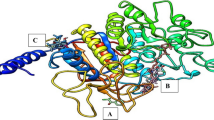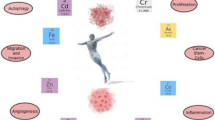Abstract
Coal-burning type of arsenism, a chronic arsenism caused by environmental arsenic pollution, found firstly at Guizhou Province of China, manifested as the disruption of pro- and anti-inflammatory T cell balance and multiple organ damage, while no specific treatment for the arsenism patients. The effect of methylation of the forkhead box P3 (Foxp3) promoter region on arsenic-induced disruption of pro- and anti-inflammatory T cell balance was first evaluated in this study, between the control and arsenism groups. The results show that arsenic can induce the hypermethylation of 6 sites in the Foxp3 promoter by upregulating the expression of recombinant DNA Methyltransferase 1 (Dnmt1) mRNA, leading to the downregulation of Foxp3 mRNA, Tregs, and interleukin 10 (IL-10, anti-inflammatory cytokine) levels, and increased the levels of interleukin 17 (IL-17, pro-inflammatory cytokine) in the peripheral blood of patients with arsenic poisoning. Further randomized controlled double-blind experiments (including the placebo control groups and the Ginkgo biloba extract (GBE) intervention groups) showed that compared to the placebo control group or before GBE intervention, the levels of Dnmt1 mRNA, Foxp3 methylation, and IL-17 in the peripheral blood of the GBE intervention group were significantly decreased after intervention (P < 0.05), but the levels of regulatory T cells (Tregs) and IL-10 were significantly increased (P < 0.05). Our study provides some limited evidence that GBE can attenuate the disruption of pro- and anti-inflammatory balance of peripheral blood in arsenism patients by decreasing hypermethylation of the Foxp3 promoter region. This study provides scientific basis for further understanding a possible natural medicinal plant, GBE, as a more effective measure to prevent and control the disruption of pro- and anti-inflammatory balance caused by coal-burning type of arsenism.



Similar content being viewed by others
References
Zhang A, Feng H, Yang G, Pan X, Jiang X, Huang X, Dong X, Yang D, Xie Y, Peng L et al (2007) Unventilated indoor coal-fired stoves in Guizhou province, China: cellular and genetic damage in villagers exposed to arsenic in food and air. Environ Health Perspect 115:653–658
Zeng Q, Luo P, Gu J, Liang B, Liu Q, Zhang A (2017) PKC theta-mediated Ca(2+)/NF-AT signalling pathway may be involved in T-cell immunosuppression in coal-burning arsenic-poisoned population. Environ Toxicol Pharmacol 55:44–50
Gu J, Zhang A, Zhang B, Huang X (2009) Influence of coal-arsenic exposure on human T cells proliferation and its mechanism. Chinese journal of endemiology 28:20–23
Xu Y, Zhang A, Li J, Yu C, Yao M, Pan H, Zeng Q, He J (2015) Effects of Ginkgo biloba on immune toxicity of rats exposed to arsenic. Chinese journal of endemiology 34:25–28
Mohr A, Atif M, Balderas R, Gorochov G, Miyara M (2019) The role of FOXP3(+) regulatory T cells in human autoimmune and inflammatory diseases. Clin Exp Immunol 197:24–35
Haiqi H, Yong Z, Yi L (2011) Transcriptional regulation of Foxp3 in regulatory T cells. Immunobiology 216:678–685
Rudensky AY (2011) Regulatory T cells and Foxp3. Immunol Rev 241:260–268
Tseng WY, Huang YS, Clanchy F, McNamee K, Perocheau D, Ogbechi J, Luo SF, Feldmann M, McCann FE, Williams RO (2019) TNF receptor 2 signaling prevents DNA methylation at the Foxp3 promoter and prevents pathogenic conversion of regulatory T cells. Proc Natl Acad Sci U S A 116:21666–21672
Chan PC, Xia Q, Fu PP (2007) Ginkgo biloba leave extract: biological, medicinal, and toxicological effects. J Environ Sci Health C Environ Carcinog Ecotoxicol Rev 25:211–244
Wang X (2014) Research on effect of ginkgo aglucone flavone to human body organs and immune function. Pak J Pharm Sci 27:1099–1102
Xu Y, Zou Z, Liu Y, Wang Q, Sun B, Zeng Q, Liu Q, Zhang A (2020) miR-191 is involved in renal dysfunction in arsenic-exposed populations by regulating inflammatory response caused by arsenic from burning arsenic-contaminated coal. Hum Exp Toxicol 39:37–46
Livak KJ, Schmittgen TD (2001) Analysis of relative gene expression data using real-time quantitative PCR and the 2(-Delta Delta C(T)) method. Methods 25:402–408
Wang D, Luo P, Zou Z, Wang Q, Yao M, Yu C, Wei S, Sun B, Zhu K, Zeng Q et al (2019) Alterations of arsenic levels in arsenicosis residents and awareness of its risk factors: a population-based 20-year follow-up study in a unique coal-borne arsenicosis county in Guizhou, China. Environ Int 129:18–27
Zeng Q, Zou Z, Wang Q, Sun B, Liu Y, Liang B, Liu Q, Zhang A (2019) Association and risk of five miRNAs with arsenic-induced multiorgan damage. Sci Total Environ 680:1–9
Zhu Z, Fei Y, Zhang A, Luo D (2004) Immune function change in patients with coal-burning type of arsenism. Chinese journal of endemiology 23:13–15
Xia S, Sun Q, Zou Z, Liu Y, Fang X, Sun B, Wei S, Wang D, Zhang A, Liu Q (2020) Ginkgo biloba extract attenuates the disruption of pro-and anti-inflammatory T-cell balance in peripheral blood of arsenicosis patients. Int J Biol Sci 16:483–494
Sun X, Cui Y, Feng H, Liu H, Liu X (2019) TGF-beta signaling controls Foxp3 methylation and T reg cell differentiation by modulating Uhrf1 activity. J Exp Med 216:2819–2837
Chen J, Zhan C, Zhang L, Zhang L, Liu Y, Zhang Y, Du H, Liang C, Chen X (2019) The hypermethylation of Foxp3 promoter impairs the function of Treg cells in EAP. Inflammation 42:1705–1718
Ohkura N, Hamaguchi M, Morikawa H, Sugimura K, Tanaka A, Ito Y, Osaki M, Tanaka Y, Yamashita R, Nakano N et al (2012) T cell receptor stimulation-induced epigenetic changes and Foxp3 expression are independent and complementary events required for Treg cell development. Immunity 37:785–799
Zhu L, Jia L, Liu Z, Zhang Y, Wang J, Yuan Z, Hui R (2019) Elevated methylation of FOXP3 (Forkhead Box P3)-TSDR (regulatory T-cell-specific demethylated region) is associated with increased risk for adverse outcomes in patients with acute coronary syndrome. Hypertension 74:581–589
Wu Y, Zhao Y, Xu T, You L, Zhang H, Liu F (2019) Alzheimer’s disease affects severity of asthma through methylation control of Foxp3 promoter. J Alzheimers Dis 70:121–129
Liu Q, Du F, Huang W, Ding X, Wang Z, Yan F, Wu Z (2019) Epigenetic control of Foxp3 in intratumoral T-cells regulates growth of hepatocellular carcinoma. Aging (Albany NY) 11:2343–2351
Chen YJ, Huang CH, Shi YJ, Lee YC, Wang LJ, Chang LS (2018) The suppressive effect of arsenic trioxide on TET2-FOXP3-Lyn-Akt axis-modulated MCL1 expression induces apoptosis in human leukemia cells. Toxicol Appl Pharmacol 358:43–55
Fang X, Xia S, Zhu K, Dong L, Zou Z, Liu Y, Wang D, Zhang A (2019) Differential expression and significance of Foxp3, TGF-β1 and IL-2 in peripheral blood of patients with coal-burning arsenic poisoning. Chinese journal of endemiology 38:91–95
Sturm R, Xanthopoulos L, Heftrig D, Oppermann E, Vrdoljak T, Dunay IR, Marzi I, Relja B (2020) Regulatory T cells modulate CD4 proliferation after severe trauma via IL-10. J Clin Med 9:1052
Yao M, Zhang A, Yu C, Xu Y, Hu Y (2017) Effect of Ginkgo biloba on liver injury of arsenic poisoning rats caused by corn flour baked by high-arsenic coal. Chinese journal of endemiology 36:333–337
Roy JS, Chatterjee D, Das N, Giri AK (2018) Substantial evidences indicate that inorganic arsenic is a genotoxic carcinogen: a review. Toxicol Res 34:311–324
Pietta PG (2000) Flavonoids as antioxidants. J Nat Prod 63:1035–1042
Serafini M, Peluso I, Raguzzini A (2010) Flavonoids as anti-inflammatory agents. Proc Nutr Soc 69:273–278
Hu Y, Yu C, Yao M, Wang L, Liang B, Zhang B, Huang X, Zhang A (2018) The PKCdelta-Nrf2-ARE signalling pathway may be involved in oxidative stress in arsenic-induced liver damage in rats. Environ Toxicol Pharmacol 62:79–87
Chen XJ, Ren SM, Dong JZ, Qiu CG, Chen YW, Tao HL (2019) Ginkgo biloba extract-761 protects myocardium by regulating Akt/Nrf2 signal pathway. Drug Des Devel Ther 13:647–655
Freudenberg K, Lindner N, Dohnke S, Garbe AI, Schallenberg S, Kretschmer K (2018) Critical role of TGF-beta and IL-2 receptor signaling in Foxp3 induction by an inhibitor of DNA methylation. Front Immunol 9:125
Pyzik M, Piccirillo CA (2007) TGF-beta1 modulates Foxp3 expression and regulatory activity in distinct CD4+ T cell subsets. J Leukoc Biol 82:335–346
Dai J, Xu M, Zhang X, Niu Q, Hu Y, Li Y, Li S (2019) Bi-directional regulation of TGF-beta/Smad pathway by arsenic: a systemic review and meta-analysis of in vivo and in vitro studies. Life Sci 220:92–105
Sherif IO, Al-Shaalan NH, Sabry D (2019) Ginkgo biloba extract alleviates methotrexate-induced renal injury: new impact on PI3K/Akt/mTOR signaling and MALAT1 expression. Biomolecules 9:691
Zeng Q, Wei S, Sun B, Zhang A (2021) Assessing the potential value and mechanism of Ginkgo biloba L. on coal-fired arsenic-induced skin damage: in vitro and human evidence. Hum Exp Toxicol 40:2113–2122
Chen X, Wang D, Sun B, Liu C, Zhu K, Zhang A (2021) GBE attenuates arsenite-induced hepatotoxicity by regulating E2F1-autophagy-E2F7a pathway and restoring lysosomal activity. J Cell Physiol 236:4050–4065
Acknowledgements
This work was supported by the National Natural Science Foundation of China (81430077 and U1812403).
Author information
Authors and Affiliations
Contributions
Xiaolin Fang performed the experiments and data curation and wrote the original draft preparation. Qibing Zeng modified English editing. Baofei Sun, Shaofeng Wei, Zhonglan Zou, Shiqing Xia, and Peng Luo participated in visualization, investigation, and validation. Aihua Zhang made research design, supervised, and funded this research.
Corresponding author
Ethics declarations
Competing Interests
The authors declare no competing interests.
Additional information
Publisher's Note
Springer Nature remains neutral with regard to jurisdictional claims in published maps and institutional affiliations.
Supplementary Information
Below is the link to the electronic supplementary material.
Rights and permissions
About this article
Cite this article
Fang, X., Zeng, Q., Sun, B. et al. Ginkgo biloba Extract Attenuates the Disruption of Pro- and Anti-inflammatory Balance of Peripheral Blood in Arsenism Patients by Decreasing Hypermethylation of the Foxp3 Promoter Region. Biol Trace Elem Res 200, 4967–4976 (2022). https://doi.org/10.1007/s12011-022-03101-0
Received:
Accepted:
Published:
Issue Date:
DOI: https://doi.org/10.1007/s12011-022-03101-0




